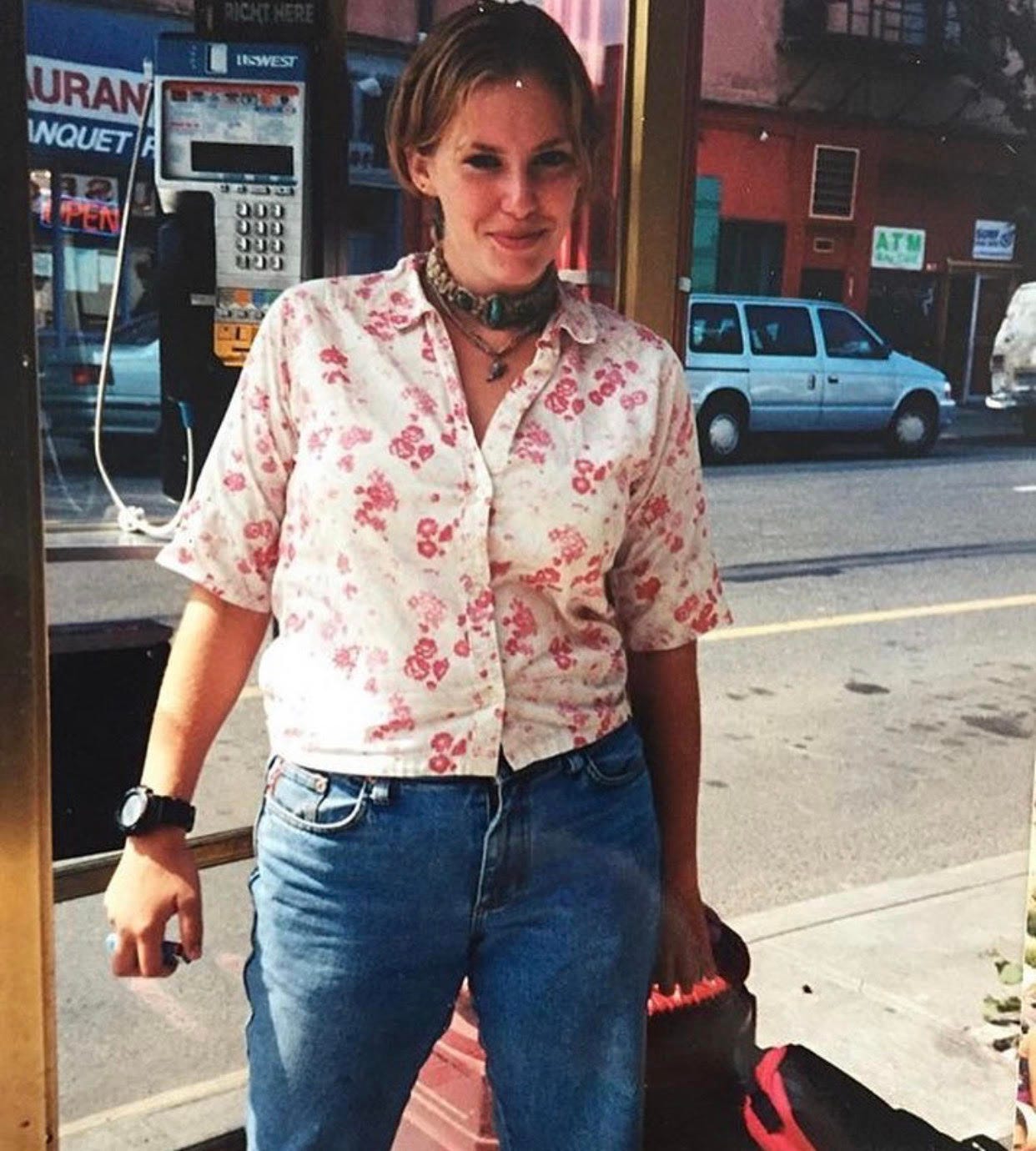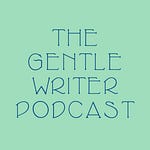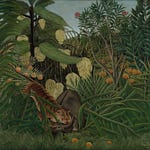This is the first missive of Hermitage. You can read or listen to this newsletter (or both). If you enjoy it, please (please) share it on social media, send it to a friend, or become a paying subscriber.
Song of Myself, 51
Walt Whitman - 1819-1892
The past and present wilt—I have fill'd them, emptied them.
And proceed to fill my next fold of the future.
Listener up there! what have you to confide to me?
Look in my face while I snuff the sidle of evening,
(Talk honestly, no one else hears you, and I stay only a minute longer.)
Do I contradict myself?
Very well then I contradict myself,
(I am large, I contain multitudes.)
I concentrate toward them that are nigh, I wait on the door-slab.
Who has done his day's work? who will soonest be through with his supper?
Who wishes to walk with me?
Will you speak before I am gone? will you prove already too late?
My birth certificate reads Janet Anastasia Selby, but my mom called me Stacy when I was born. Maybe this was it. The beginning of me wanting to be someone else. Janet was my grandmother’s name, and I was her namesake. We were soul mates. If my mother had called me by my first name would I have kept it?
The first dwelling I remember is the basement room I shared with my mom when I was in kindergarten. Our landlords were John and Yvonne, a kind older couple, and my mom and I lived on canned food and powdered milk. My clothes were hand-me-downs from my stingy rich uncle; our furniture was theirs, too.
My mom brought a lot of men over. I often lay awake in her bed, where we both slept, staring at the popcorn ceiling and trying to force the scary images my imagination naturally created into unicorns or teddy bears. It never worked. Skulls, their edges red and glowing, formed above me. Grim reapers. Monsters.
In the living-room I could hear my mom and her men, the records they played, their laughing and the dulling of their voices until they slipped into murmurs. I imagined myself into the lives of my classmates, who smelled of laundry detergent and seemed taken care of. My clothes were often unwashed. I couldn’t sit still at my desk and was held back a year. I remember, the following autumn, passing the row of graduated kindergartners, now first-graders, and the way they looked at me. Some of them made fun of me, and soon all my fellow kindergartners knew I’d been held back, that I was a foreigner amongst them.
I don’t remember the name of that school.
As long as memory serves me, I have been imagining myself into other people’s bodies, imagining myself into their lives. I recall my schools through the popular girls, whose lives I wanted to inhabit so badly. Through the popular boys, who I hoped would save me. The world told me I needed to be saved by a boy.
Maybe it was that we moved so much, and after moving enough I learned that I didn’t have to bring myself with me. I could be anyone. I’d pretend to be someone else until my mask slipped and I needed to hide again, but it was okay because we would move again and I could start over. Somewhere along the way my name stopped feeling like my own name, and I asked my mom and my new stepdad to call me Janet. I was thirteen. I thought Janet sounded nice because I loved Janet Jackson and I wanted to be Black. Black people were nicer than white people, from my personal experience. But Janet didn’t change how much I didn’t feel at home in my body, or at home with my mother and my stepdad.
Running away didn’t change it either. I left first when I was twelve, then thirteen, then regularly until I hitch-hiked to California at sixteen. On the road I tried out all kinds of different names. Simone. Wildflower. Chynna. It didn’t matter what name I used— I lived in a different country, on a different planet. I wasn’t like the people who picked me up, people who sometimes hurt me but mostly helped me. I lived in a body, but didn’t know how to be in a body. I was untethered, floating in space.
That sensation of being untethered has never fully dissipated. I could examine and reexamine the possible causes for my feelings of unbelonging, but I know its causes are too myriad to be grasped. I’ve changed my name three times since Janet. Ana. Anastasia. And now, back to Stacy, which feels like a name should feel. Not perfect. Not completely fitting. But mine. My name.
Am I untethered? Or is this sense of untetherdness a product of my culture? When I am able to sidestep my American cultural training I can see clearly that our culture is absolutely unhinged, ungrounded, and, in essence, toxic. It’s constructed of binaries that pit us against each other and ourselves. It deprioritizes nuance.
When I scroll too long through the infinite ribbon of the internet, I lose myself. My thoughts are reworked and transformed into communal thoughts, programmed thoughts. I didn’t notice this as much until I left social media. But in the quiet outside of the scrolling and screeching, I could hear myself again. I found solitude and silence, and turned the pages of books, wherein existed so many ideas to be contemplated, rather than inundated with and buried in.
When I read, I often look up. I pause. I ponder. When I am on my phone, scrolling on social media, it takes so much of my willpower to put my phone down when I know I should. I reach for it constantly, as if it were a binky, as if I were a baby needing soothing.
When I read, images blossom in my mind. Connection are consciously made. When I scroll, I lose myself. I begin to look at myself differently depending on what I am looking at. I begin to think I may be doing something wrong. There may be something wrong with me. Why aren’t people liking my posts? Why doesn’t my life look like (blank)’s life? Why can’t I afford to buy every type of candle that’s marketed to me.
Online, I am lost in the ludic loop. A kind of insanity. I am a dopamine seeking missile.
The more time I spend on social media in particular, the more I notice my opinions flattening and becoming dulled. To say something impactful on social media requires a kind of binary approach. It’s less about meaning and more about how to get and keep attention. Want to bring attention to a cause? Find the enemy of that cause. Make an enemy, and people will take action.
One of my favorite witches, Amanda Yates Garcia, sent out an email about a month and a half ago saying she was taking a social media hiatus. She said that on Instagram, her more thoughtful posts were often overlooked and underliked in favor of any posts that were more superficial. For me, this manifests in my most “liked” posts always being selfies. Annoying.
So what does this have to do with my sense of self or selves?
It’s this: having grown up with no grounding, no real home base, and no unconditional and steady love from anyone, my sense of self is, simply put, sometimes fragile. I do a lot of inner work to keep myself grounded, but there are times that I find myself looking at myself from the outside, judging and criticizing. Policing myself.
I lose touch with what I want, and what I need, instead focusing on the reactions or perceived reactions of the people surrounding me. In real life, this is easier to manage. When people are in front of me, I can feel them. Feel their energy, and along with it, my intuition. But online, my feelings are dulled, and I inevitably begin to exist as a sort of object to myself. I objectify myself as seen through the eyes of social media.
This habit of self-objectification isn’t only brought about by the internet, as the internet didn’t exist when I was younger, and when I began looking at myself in this way. TV started it. My mother, who was ultra-critical and sometimes abusive, started it. I policed myself to make sure nothing I did made her upset (though it was impossible to conform to her standards, which were milky and oblique). But social media magnifies everything. I say everything, but I think it magnifies the negative, and not so much the positive. It becomes, a lot of the time, a hollow performance. Even things on the internet that encourage inclusivity and self-acceptance inherently discourage the kind of deep self work that’s necessary for real growth.
My curiosity has been piqued by my month’s long absence from social media I took last winter. I am curious: what would it feel like to spend a year without any exposure to social media?
One of my mentors, Dana Spiotta, told me that leaving social media is the highest form of self care. Is it? I won’t know unless I try. So, beginning on September 1st 2021, I am taking a year off of social media. Truth be told, I’m excited. I really am. I need the respite. I need the quiet. I am ready for it. We’ll see how it goes.
Stuff I’ve enjoyed this week:
I loved this piece about the history of Emily Dickinson’s black cake.
Tiny things have always been adorable to me. You too? Read this piece on the ceramicists who are making tiny lil menageries.
Look at these amazing masks handmade by various Mexican artists, which depict covid in a myriad of ways.
This week I got kind of into videos of feral cats becoming friendly. What’s not to like about that? There’s this one in which a feral cat makes friends with a kitten, and this one with blind Apollo who regains his sight and learns to love his humans, and this last one where a feral kitten gets the love she deserves.
Sometimes I happen upon artists I really love, and this week I have been obsessed with Gabrielle Brown, whose paintings are chaotic and beautiful and full of emotion and history. You can find the painting below for sale on her Facebook page.
I’m almost done with White Magic by Elissa Washuta. It took me a minute to get into it, but it’s stunning. I especially like the Indigenous and historical perspective on Seattle. Here’s a video of her being interviewed while she was writer-in-residence at Fremont bridge.
That’s all for this week. Please share if you enjoyed this and let me know what resonates for you by leaving a comment.


















Share this post